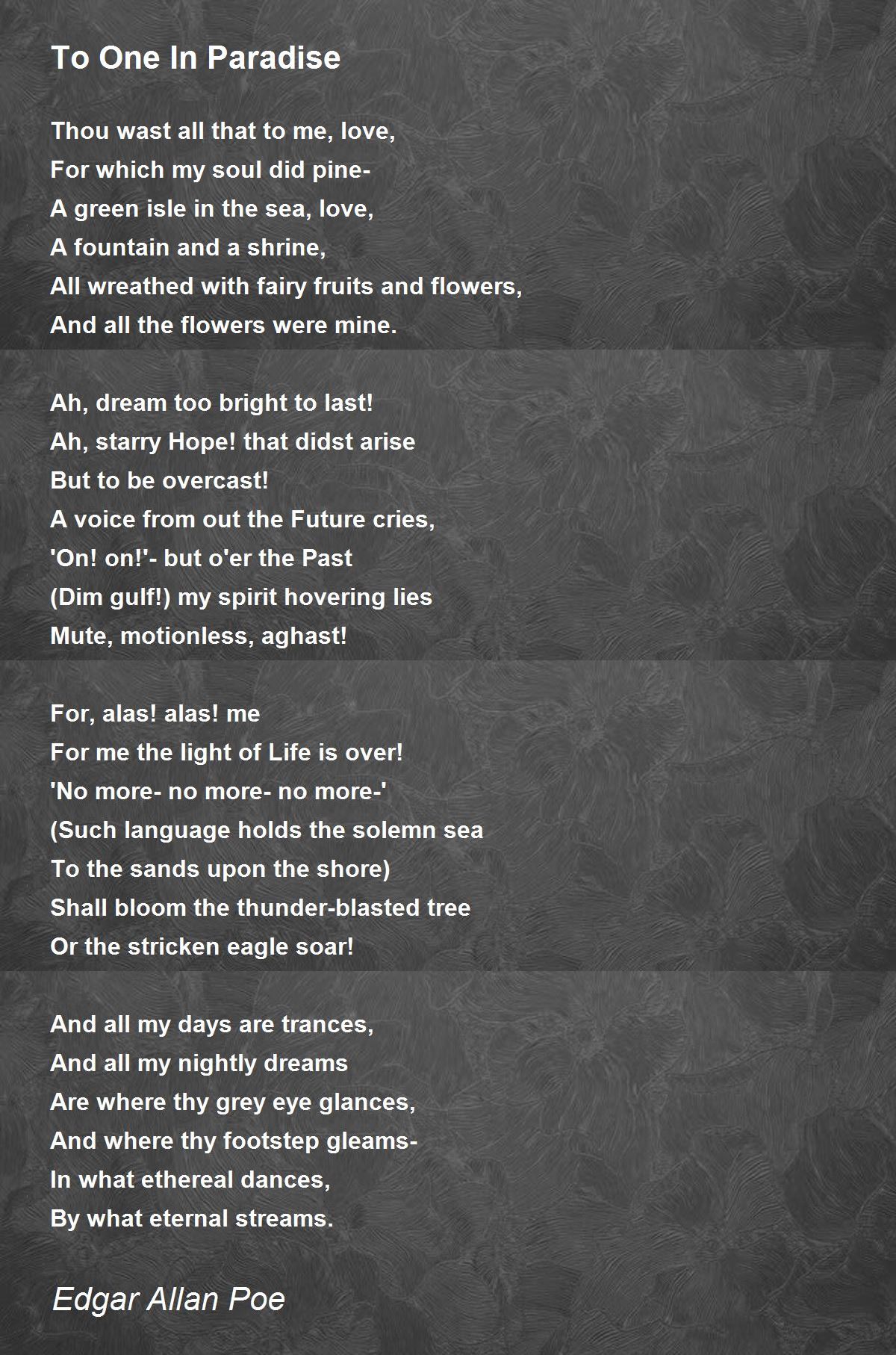“To One in Paradise” by Edgar Allan Poe

On the first read of “To One in Paradise”, I felt like I had just read a lot of nothing. However, upon further reading and looking up some words, I began to understand and feel more confident in my interpretation of what happened in the poem. I started by looking up the word “pine” in the first stanza and found it refers to the idea that one has suffered due to a broken heart. I also looked up fairy fruits and flowers, which refers to an object that makes one “suggestible”. The next line in the stanza then claims that the thing wrapped in flowers was once the speakers, allowing me to put the pieces together to understand that the object of “love” which was found in “a green isle in the sea” (the paradise mentioned in the title) was something that the speaker was dearly fond of.

Following the establishment of that fact, I found the next stanza to focus on the idea that the dream of holding onto this subject of affection was “too bright to last”. Yet, the way it was presented interested me. The entire stanza is riddled with exclamation points, and with the usage of quotation marks giving the “Future” a voice, it seems as if the speaker and the past are both having a conversation about how the future beckons the speaker to move forward but the speaker cannot. Another interesting note I made is that both Past and Future are mentioned with capital letters, making them seem like actual names for people, furthering my hypothesis of the speaker having a conversation with these entities. The only thing I wasn’t quite sure of was the words in parentheses (one of only two times parentheses are used in the poem), “Dim gulf”, which confused me, as while I suppose that dim refers to the darkness the speaker feels, I do not know what the gulf the speaker mentions is. So aftering looking it up, I found that gulf could also mean a deep ravine, allowing me to interpret this very small line as perhaps a capsule of the speaker’s mental state of being in a very dark place.
Regardless, the speaker continues the conversation in the third stanza, but only with himself and with less intensity. The speaker argues that with the “light of Life” over, and I noticed a heavy emphasis on the idea of “no more” peppered with the usage of consecutive dashes. The issue in my understanding then comes with the next few lines. The speaker mentions that “such language” is the type that “holds the solemn sea to the sands”, but this line is inside a parentheses, making me believe that this line isn’t as important or even a throw-away idea. This, of course, was not the case, as I also found the rhyme scheme of ABAB to continue in the parentheses, as well as the following sentence not flowing with the “no more” that happens before the parentheses. So the purpose of this line still befuddles me as to what purpose it serves. Moving past this line, I also felt the next lines seem loosely connected to the “light of Life”, as the light illuminates the thunder blasted tree. I thought this alluded to the fact that the tree has been hit by lightning or a light of life before (I also thought that the tree could potentially symbolize the speaker). The eagle that rises could rise as a result also could symbolize the speaker, so perhaps the speaker considers it a possibility that he could rise up stronger after being stricken.

After I thought of this idea, I noticed the speaker shifts the poem away from a conversation back to a descriptive stanza of the current state of his life. The speaker places a heavy emphasis on the ABAB rhyme scheme which describes the speaker’s life of “trances” and “dreams” which glance and gleam in a dance that eternally streams. To me, this stanza was used by the speaker to describe how meaningless his life feels after losing the object of love he found in paradise. He allows himself to get taken by the flow of life as he can only think about the past movements of the “grey eye” and footsteps of his adored but now lost love. This stanza popped out to me for the repetition in the way it was structured, as the lines come in pairs that start off exactly the same and bring contrasting images together. The last two lines also were similar but in a different way. With the mention of “ethereal” and “eternal”, both words of which visually look similar and contain the idea of long winding obscurity which I interpreted to give the poem a somber note to end on.

Overall, despite areas lacking clarity, I came to the conclusion that the speaker is expressing how his love found in paradise was only fleeting in nature. The idea that the speaker was trying to spread to his audience was not to take the good times of paradise lightly, as there will never be such a thing as an eternal paradise. Perhaps there is even more nuance that I missed, as I always do, but I feel like my process with this poem and the things I have managed to notice and derive from it have been a great improvement from when I first started.